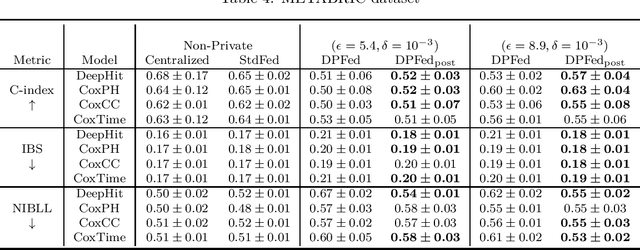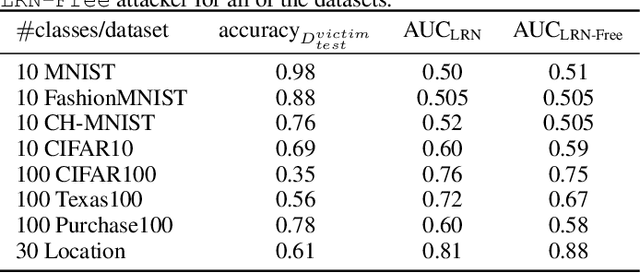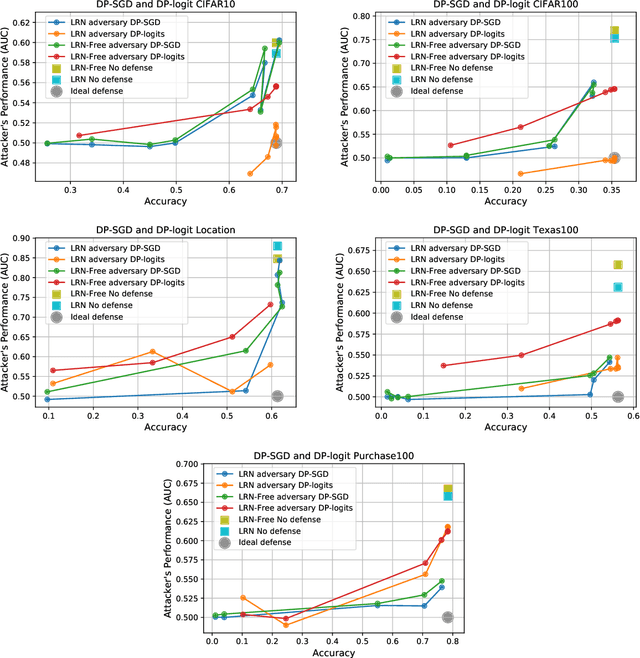Shadi Rahimian
Practical Challenges in Differentially-Private Federated Survival Analysis of Medical Data
Feb 08, 2022



Abstract:Survival analysis or time-to-event analysis aims to model and predict the time it takes for an event of interest to happen in a population or an individual. In the medical context this event might be the time of dying, metastasis, recurrence of cancer, etc. Recently, the use of neural networks that are specifically designed for survival analysis has become more popular and an attractive alternative to more traditional methods. In this paper, we take advantage of the inherent properties of neural networks to federate the process of training of these models. This is crucial in the medical domain since data is scarce and collaboration of multiple health centers is essential to make a conclusive decision about the properties of a treatment or a disease. To ensure the privacy of the datasets, it is common to utilize differential privacy on top of federated learning. Differential privacy acts by introducing random noise to different stages of training, thus making it harder for an adversary to extract details about the data. However, in the realistic setting of small medical datasets and only a few data centers, this noise makes it harder for the models to converge. To address this problem, we propose DPFed-post which adds a post-processing stage to the private federated learning scheme. This extra step helps to regulate the magnitude of the noisy average parameter update and easier convergence of the model. For our experiments, we choose 3 real-world datasets in the realistic setting when each health center has only a few hundred records, and we show that DPFed-post successfully increases the performance of the models by an average of up to $17\%$ compared to the standard differentially private federated learning scheme.
Sampling Attacks: Amplification of Membership Inference Attacks by Repeated Queries
Sep 01, 2020



Abstract:Machine learning models have been shown to leak information violating the privacy of their training set. We focus on membership inference attacks on machine learning models which aim to determine whether a data point was used to train the victim model. Our work consists of two sides: We introduce sampling attack, a novel membership inference technique that unlike other standard membership adversaries is able to work under severe restriction of no access to scores of the victim model. We show that a victim model that only publishes the labels is still susceptible to sampling attacks and the adversary can recover up to 100% of its performance compared to when posterior vectors are provided. The other sides of our work includes experimental results on two recent membership inference attack models and the defenses against them. For defense, we choose differential privacy in the form of gradient perturbation during the training of the victim model as well as output perturbation at prediction time. We carry out our experiments on a wide range of datasets which allows us to better analyze the interaction between adversaries, defense mechanism and datasets. We find out that our proposed fast and easy-to-implement output perturbation technique offers good privacy protection for membership inference attacks at little impact on utility.
Segmentations-Leak: Membership Inference Attacks and Defenses in Semantic Image Segmentation
Dec 20, 2019



Abstract:Today's success of state of the art methods for semantic segmentation is driven by large datasets. Data is considered an important asset that needs to be protected, as the collection and annotation of such datasets comes at significant efforts and associated costs. In addition, visual data might contain private or sensitive information, that makes it equally unsuited for public release. Unfortunately, recent work on membership inference in the broader area of adversarial machine learning and inference attacks on machine learning models has shown that even black box classifiers leak information on the dataset that they were trained on. We present the first attacks and defenses for complex, state of the art models for semantic segmentation. In order to mitigate the associated risks, we also study a series of defenses against such membership inference attacks and find effective counter measures against the existing risks. Finally, we extensively evaluate our attacks and defenses on a range of relevant real-world datasets: Cityscapes, BDD100K, and Mapillary Vistas.
 Add to Chrome
Add to Chrome Add to Firefox
Add to Firefox Add to Edge
Add to Edge